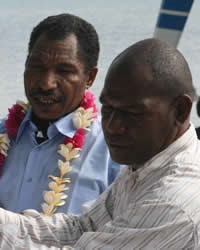Anuki, Gabobora in Papua New Guinea

Photo Source:
Anonymous
|
Send Joshua Project a map of this people group.
|
| People Name: | Anuki, Gabobora |
| Country: | Papua New Guinea |
| 10/40 Window: | No |
| Population: | 800 |
| World Population: | 800 |
| Primary Language: | Anuki |
| Primary Religion: | Christianity |
| Christian Adherents: | 90.00 % |
| Evangelicals: | 25.00 % |
| Scripture: | Portions |
| Ministry Resources: | Yes |
| Jesus Film: | No |
| Audio Recordings: | Yes |
| People Cluster: | New Guinea |
| Affinity Bloc: | Pacific Islanders |
| Progress Level: |
|
Introduction / History
The Gabobora people live along the north coast of Cape Vogel, Milne Bay Province, Papua New Guinea. Each of the villages is well-kept, sometimes with grassy compounds. Peripheral decorative shrubbery, coconut palms, and mango trees mark most villages. There are abundant local fish, birds and wildlife.
Celebratory feasts are part of the routine of the Gabobora peoples' lives - for weddings, funerals, the birth of first child, and harvest. Large competitive feasting events are within living memory of all of the adults of the community (Cf. Michael Young, 1971. Fighting with Food). The people have a strong sense of cultural identity that is now intricately woven within activities of the Anglican Church as well as local sport. In sport the Anuki field teams in volleyball, netball (a kind of basketball), and football (soccer) for local competition.
Church activities fill the weekly calendar. Their church services are conducted in regional languages as well as English, with announcements and lay comments in Anuki. However, they lack Anuki Scriptures in the church context. These would add immeasurably to their understanding of the religious practices faithfully followed by so many. Priests and lay leaders alike have expressed the desire to have God's Word in the Anuki language. Outside sources have noted them to be "very interested" in having such a translation.
The Anuki community has produced three illustrated short-story booklets by Gabobora authors, all penned in the Anuki language, and a small hymn book of Anuki choruses. Recently they joined project VITAL (Vernacular Initiative in Translation And Literacy), a multi-language translation project in Milne Bay province. Through VITAL the Anuki translation team has started working on a dictionary. They have completed chapters four to six of Mark and twenty trial copies have been distributed.